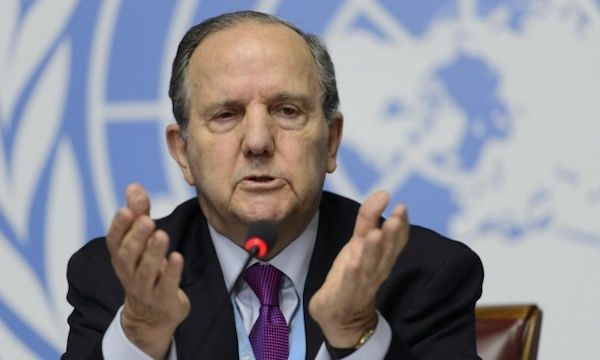
The Pentagon has announced that it is denying the United Nations’ torture investigator to interview Guantanamo Bay detainees, thus preventing him from effectively examining the facility to see whether claims of “cruel, inhuman and degrading treatment” are true.
The Guardian reports:
Méndez told reporters in Geneva last week that he had spurned what he considered hollow offers by the US to visit Guantánamo, citing unacceptable restrictions on his ability to examine the facility for himself.
“I am not allowed to have any unmonitored or even monitored conversations with any inmate in Guantánamo Bay,” Méndez said, according to AFP.
Méndez, who has been in fruitless negotiations with the Obama administration over touring Guantánamo since 2010, has said he considers indefinite detention “itself a form of cruel, inhuman and degrading treatment”. Forced feedings, which can include the insertion of tubes, used by Guantánamo officials to break detainee hunger strikes – and defended by Barack Obama – “in some cases can amount to torture,” Mendez’s office has said.
Caggins said via email the US had offered multiple UN special rapporteurs, including Méndez, “a degree of access to its detention facilities at Guantánamo under conditions consistent with the nature of those facilities (eg, facility visits do not include private meetings with detained enemy forces), although no one has accepted the offer.”
On Friday, Guantánamo Bay opened its gates to five newly elected Republican senators, including Tom Cotton, the Arkansas Republican who at a February hearing said the remaining 122 detainees could “rot in hell”.
“After visiting today, I remain firm in my belief that this facility should not only remain open – but that we should not shy away from increasing the number of prisoners held there,” Cotton said in a Saturday press release.
The Pentagon permits the International Committee of the Red Cross (ICRC) access to Guantánamo, to include visits to detainees. By tradition, the ICRC does not publicly discuss its visits to prisons and wartime detention centers.
“Due to its special role under the law of war, the ICRC has full access to the detainees at Guantánamo, including private meetings, and maintains an ongoing dialogue with the United States regarding conditions of confinement and the detainees’ overall wellbeing,” Caggins said.
Laura Pitter of Human Rights Watch said denying Méndez access to the detainees was consistent with the Obama administration’s “continued policy of secrecy” overhanging Guantánamo.
“Yes, the US gives the ICRC access but that access is subject to strict confidentiality. If the US is truly treating detainees humanely at Guantánamo and it [is] proud of the detention conditions there, why not open the facility up for inspection by the UN special rapporteur, who has access to other prisons all over the world,” Pitter said.
Though Obama has pledged to close the detention facility at Guantánamo, the general he placed in charge of US Southern Command, which is ultimately in charge of the detention facility, has enforced a press blackout on the hunger strikes and the force feedings. The Guardian is part of a lawsuit seeking the disclosure of videotaped force-feedings at Guantánamo – which the administration is fighting after a judge ordered their release last fall.
Asked at a Pentagon press conference on Thursday if the detention center at Guantánamo would close, Marine General John Kelly of Southern Command said: “I don’t know. Certainly, the president wants to close it.”
“If the Obama administration is really committed to transparency, it ought to put up or shut up, let respected UN experts interview detainees, and release the force-feeding tapes,” said Crider, who represented former Guantánamo detainee Abu Wa’el Dhiab in the federal case resulting in the feeding-tapes disclosure decision.
Crider said: “Barring the UN’s torture expert from talking to prisoners is just the Pentagon’s latest effort to keep a tight lid on the grim realities of life at Gitmo: the desperation, the pain of force-feeding, the abuse.
“And the reason they won’t let Mr Méndez interview detainees is the same reason that the administration is fighting to suppress the videotapes of my client Abu Wa’el Dhiab being strapped into a restraint chair and force-fed – the authorities don’t want Americans to see the stomach-turning truth about Guantánamo today.”
Méndez’s office did not immediately respond to a request for comment.

Be the first to comment